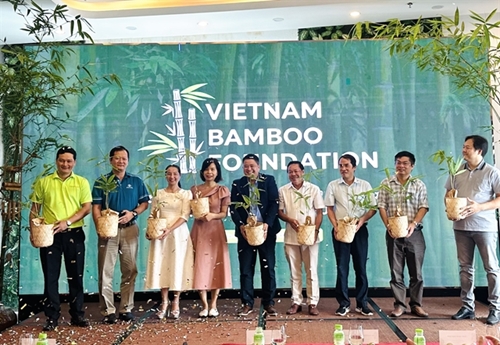The foundation, established by the social enterprise Bamboo Foundation, envisions bamboo as a powerful symbol of sustainability, innovation, and community resilience contributing to a greener, healthier, and culturally vibrant Vietnam.
With the message “Green bamboo for a green future,” it seeks to mobilize resources both domestically and internationally to unlock the full potential of the country’s bamboo sector, from production and creative industries to consumption.
    |
 |
|
The Vietnam Bamboo Foundation is officially launched on August 2 in Ho Chi Minh City, alongside its initiative “Luy Tre Lang” (Bamboo Village). |
Its mission is built around three core pillars: preserving and promoting the cultural, ecological, and social values of Vietnamese bamboo by supporting craft villages and revitalizing traditional rural landscapes; raising public awareness about bamboo’s environmental and climate-resilient benefits through communications, environmental education, and green lifestyle advocacy; and fostering research and innovation to expand bamboo’s applications across architecture, fashion, construction, agriculture, and other industries.
Known for its rapid growth and carbon absorption capabilities far exceeding that of traditional hardwoods, bamboo is increasingly seen as a sustainable alternative to materials like plastic, concrete, and steel.
It also plays a crucial role in preventing soil erosion, rehabilitating degraded land, and generating high-value products.
Despite its ubiquity across the country and its deep cultural and economic significance, the bamboo sector remains underdeveloped and fragmented.
The newly introduced “Luy Tre Lang” initiative is the foundation’s first major step toward change.
It aims to develop bamboo-centric ecological communities nationwide, with key components including building eco-villages that integrate bamboo into architecture and everyday life; establishing community cultural hubs to preserve local heritage and promote traditional education; developing bamboo-based experiential tourism linked to environmental education; creating sustainable livelihoods through bamboo crafts, eco-agriculture, and green services; and encouraging low-carbon living and responsible consumption habits at the community level.
Nguyen Tuan Khoi, chairman of the foundation, said bamboo is more than a cultural symbol. It is a practical, scalable solution for sustainable development, identity preservation, and climate resilience.
“Through this initiative, we aim to create green belts of resilience and build communities that thrive while cutting carbon emissions.”
The launch also kicks off a series of events in the lead-up to World Bamboo Day (September 18) in Vietnam, including the Vietnam Bamboo Forum, which will bring together researchers, entrepreneurs, government representatives, and communities to develop integrated strategies for the bamboo sector’s sustainable growth.
Source: VNA